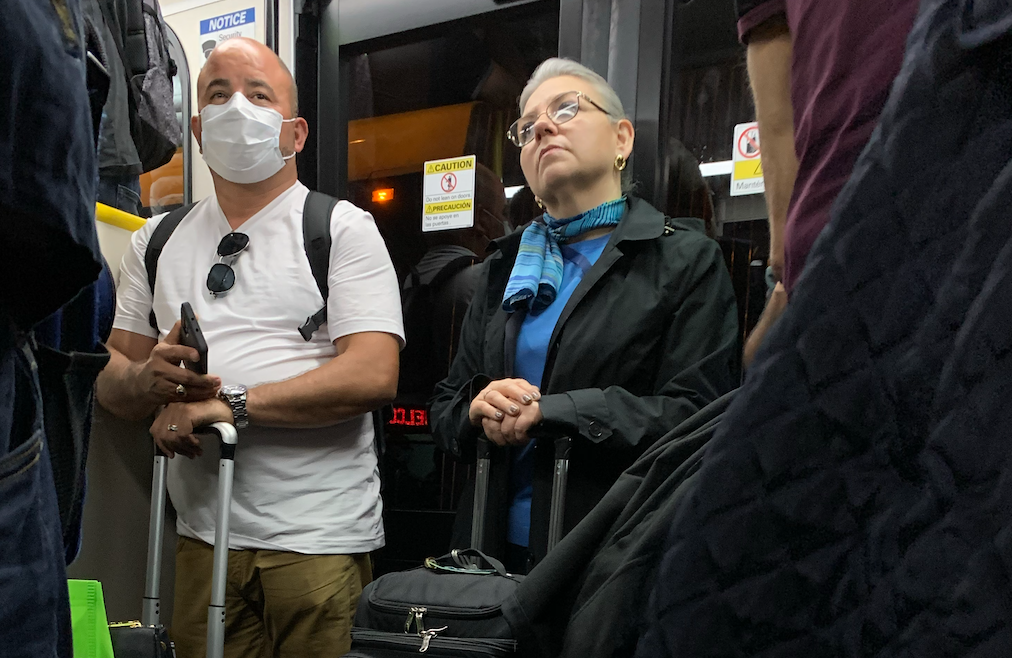I made a trip to Central Mexico last week to visit “El Viejo,” my aging father, who has lived in Mexico longer than anyplace else in his 91-year-old life. The family needed to ground-truth his situation as a recent resident of a nursing home. I was the one who was willing to travel during these times.
I planned my trip carefully: I chose first class, had disinfectant wipes, nitrile gloves, hand sanitizer gel, and face masks in my carryon bag. I chose a route that bypassed SeaTac, transiting through Portland instead. I chose a route that bypassed Los Angeles International, opting for San Jose International instead. And I wiped everything down and tossed those nitrile gloves along the way, donning new ones as I went.

Bringing coronavirus into a nursing home in central Mexico was not something I was going to do, if I had any say in it. But this was likely my last chance to see my father this side of mortality. So it was Mission Roberto, a goodbye visit, I thought when I embarked on it.
Now, a week later into this pandemic, it seems almost certain I have given my father a final kiss and tearful hug.
Mexico, unlike the USA, has not yet gone on alert about the coronavirus. But even in Chapala, south of Guadalajara, in the state of Jalisco, there are no hand sanitizer units to be found in the stores, not even in the Chapala Walmart. The Americans living in the area and those who interact with them are taking a few basic precautions, but from what I see, life goes on quite normally.
President Andres Obrador has taken an approach of “live-and-let-live,” holding mass rallies, allowing concerts and hugging his supporters, as he does. There is no social distancing in many crowded places in Mexico, anyway, but the message from the top is that “it won’t happen here.”
One can only hope. But history tells us differently. If the virus hits the nursing homes in Mexico, a whole lot of Canadians and Americans will lose loved ones.
I returned the the US on Thursday night, and I practiced the same protocols — wiping everything down with disinfectant, using gloves, dousing those gloves with hand sanitizer, and disposing of them frequently along the way.
But on the way home, I routed through Los Angeles International Airport. There, passengers leave the jet and are crammed shoulder to shoulder onto buses that take them to the international customs terminal, where they queue up in long lines before getting access to one of 100 touch screen units, where they must answer a series of questions, using their finger, and get a printed receipt.
Some travelers, particularly of Asian descent, wore masks on the bus and in the terminal, none wore gloves, and social distancing was simply not an option during any of the experience.
Those touch screens had never bothered me in the past; I’ve been through that terminal a dozen times since they were installed.
But Thursday, I noticed thousands of travelers were using them every hour from all over the world, and the screens were not being wiped between uses. LAX did not have nearly enough airport staff to perform that task, and the hand sanitizer stations were hard to find, what with all the human bodies rushing to and fro. Very few travelers sought out the hand sanitizer stations after using the screens; they rushed to find the line for the customs officer.
It looked like a recipe for a major source of coronavirus outbreak, but there was no alternative. These travelers would touch these screens and then leave this terminal and disperse to the rest of the country. Just like I did.
I took every precaution I could. I donned my mask and used my nitrile gloves on the touch screen, and then doused them with sanitizer before heading to the customs officer, who was handling hundreds of passports an hour from people arriving from everywhere.
That’s where my protocols broke down. I forgot to douse my gloves after handing my passport to the nice man, who stamped it and returned it to me.
Back in Anchorage, I’m staying away from people for a few days. I won’t be attending a fundraiser this week. I did my prepper shopping weeks ago, so I’m not lacking anything in particular.
Upon reflection, travelers can only do so much to protect themselves — and their loved ones — in these times. You do your best to flatten the curve of this coronavirus outbreak. If you don’t have to travel, you’re wise to stay put.
And yet, if you have an aging father deep in the heart of Mexico, you just might take the risk anyway, to bring him some comfort and say your goodbyes. And then go into self-quarantine for a couple of weeks, just to be sure.
